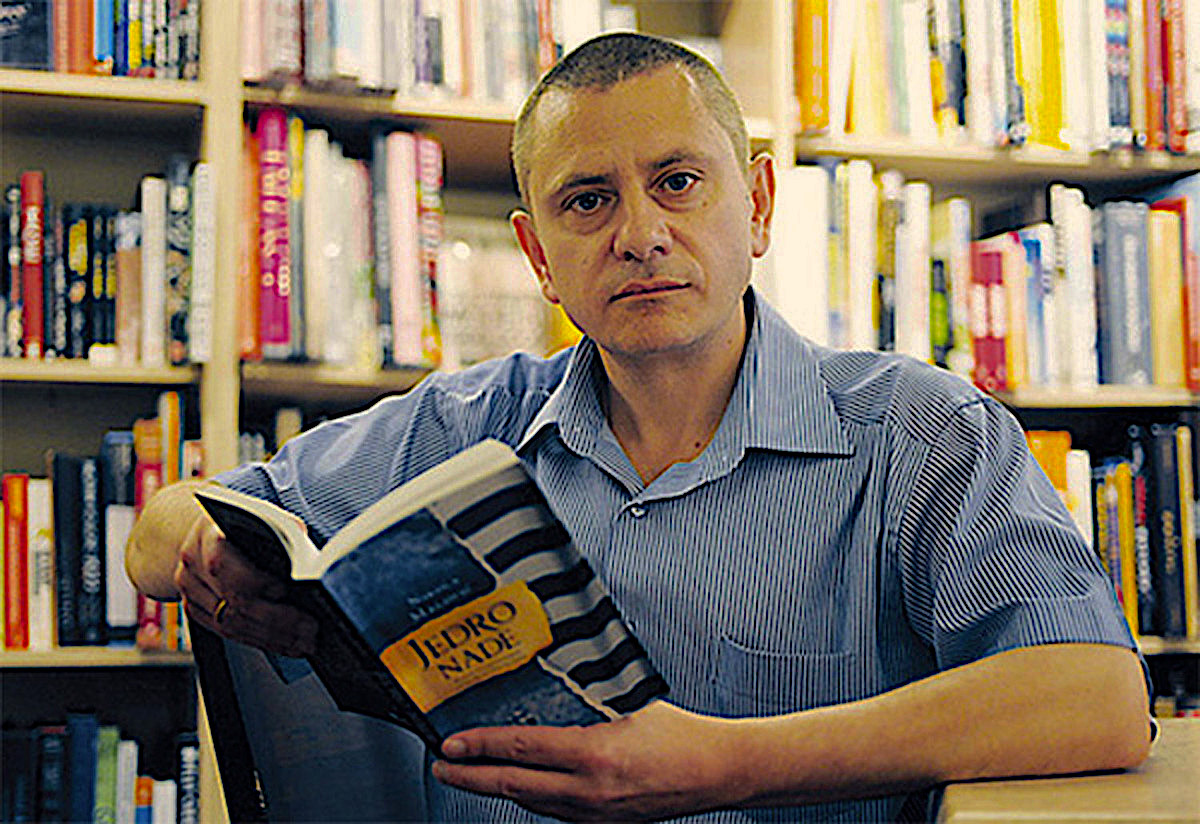Nikola Malović is one of the best and most awarded contemporary writers in Montenegro. Born in 1970 in Kotor, the artist who lives and works in Herceg Novi, may have created the best literary interpretation of the rich cultural and historical heritage of Kotor Bay and its specific lifestyle on the shores of the only fjord in the Mediterranean, in his novels. Malović has received some of the biggest literary awards in the former Yugoslavia for his books including, Borislav Pekic 2003, Lazar Komarčić 2007, Laza Kostic 2008 award, Master’s Letter for Lifetime Achievement 2008, Banja Luka Book Fair Award 2008, Branko Ćopić in 2016, and the biggest awards of the city of Herceg Novi – October award 2009. Besides being a writer, Malović’s other interest is one of the last classic bookstores in the region which has turned his own specific bookshop “So” on the main square in the old town of Herceg Novi into one of the cult gathering places for all cultural workers in this region.
#mnetoday: Soon your publishing house, Herceg Bookstore “So” will release a new book, Bokeški humor (Boka humor) of which you are the author and the editor. On the other hand, your complete work as a writer originates from or is dedicated to the Bay of Kotor. Why is there so much fascination with Boka if we exclude the normal “blood relationship” between a man and his homeland?
NM: I’m from around 1694. Unlike many of my ancestors who were seafarers and captains, I don’t travel. I used to tell my Maritime School cadets that they are like Odysseus: because they go away only to return. I have told them too, that Odysseus is known for his wanderings rather than for his other true essence – that he never left his native Ithaca. I want to testify to another centripetal, Odyssey-like essence and that is that I’ll always travel around the Bay of Kotor like a walnut shell. The past summer, I organized a Boka expedition during which we sailed by sailboat, Bavižela, over 100 miles, winding around the contours of the only fjord in the Mediterranean. This was my first and last voyage.
#mnetoday: In your works you raised a sort of literary monument to Boka. Did Boka return the favor and how?
NM: Well, well she made me a famous writer … It is difficult to answer this question and not slip into a pathetic state. However, we know that Boka in my novels is shown from the revised realistic perspectives in a way that has become theatrum mundi – the picture of the world.
#mnetoday: Your first bit of fame originated from the novel, Wandering About (Lutajući Bokelj). How was the novel created and how did the people, who saw themselves in the novel, react?
NM: There are a small number of real people and realistic characters in it. I suppose that’s the way of literature, taking everything you need from your own life and that you build a real literary hero out of five or ten people. The heroes have to be distinctive and the bay has to be marvelous. Boka Kotorska is depicted in Wandering About as an independent and sovereign bay country – accidently protectorate, because the novel speaks in political symbols. A talented reader will notice that I depict all the republics of the former Yugoslavia as having become shameful states, a vassal of geography, a postmodern mockery of the space.
#mnetoday: You have written two novels in dramatic form under the title God found in Boka. The first novel you tentatively called Catholic and the other one Orthodox. What does the interweaving of the two large interpretations of Christianity in the Bay, present in terms of this medieval cultural space?
NM: It should be noted that God found in Boka is printed in Cyrillic and Latin. The coat of arms of the Bay of Kotor doesn’t exist, and if it did exist, it should resemble the one of ancient Perast, which has on the coat of arms two hands, one on either side, holding the cross. An award-winning writer from Europe said that the Mediterranean coast is divided into those who have been baptized, and those who have not, therefore Boka falls into the baptized category. Not only is coexistence possible here, but it is the heritage of every ancient family. The whole area is a Christian family. God found in Boka is sort of a slap in the face of contemporary poets who run away from Christianity, because all the characters, except the demonic ones, believe and will believe that salvation is in a vertical direction. In the end, God is in the Bay – in the title – because I benefited from the way in which Vuk Karadzic changed the words. (Vuk Karadzic was instrumental in creating and changing the grammatical rules for the Montenegrin language.)
[quote]To teach the majority is a utopia, but the teachers, if they are ethical, take just such a vow: to teach.[/quote]
#mnetoday: Your last novel, Sail of Hope, won four awards and stirred the public a lot because it dealt with many sensitive topics such as homosexuality, the power and influence of the gay lobby, and the economic philosophy of Judaism. Risky, or simply provocative?
NM: Sail of Hope is a novel that talks about the phenomenon of the most famous, the most sexual and the most adventurous fashion design in the world, and that is a sailor’s shirt, which is also a military uniform in all the navies of the world. The story takes place in the Baroque, magnificent Perast, which as we know, has everything – thanks to the blue-white gold. However, “the final maestoso” novel explores the examined claim that the greatest navigator of all time, Christopher Columbus, probably was of Jewish origin, because it’s a little strange that there were no Catholic priests on the first three ships, as we learned but instead the famous interpreter of Hebrew, Luis de Torres sailed on them. It turns out that the first “Hello!” uttered in America was said in Hebrew, which sheds a new light on known history. These are not my theories but the famous thesis of Simon Wiesenthal. The novel talks about the people from Boka in the Russian fleet, the education of the children of the Moscow princes in Perast and also about sensitive topics. It would be risky only if the ideas were not well founded but they are, because I wrote the novel 6 years ago. The novel points a finger at pandemic homosexuality (without advocating it), which is one of the diagnoses of our time.
#mnetoday: In your books, technology has evolved, Google Ear and myPhone are just some of innovations that your heroes use. Sometimes the technology is influential like God himself and largely determines our lives whether we like it or not. Could this be a substitution for the will of God?
NM: Of course not. We live in times where technology is teleological, it wants to amaze with wonders and perform miracles but even above the all-seeing Google Earth’s memories, in the novel and in real life, God is primal.
#mnetoday: Everything you write is wrapped up in a Boka-atmosphere; landscapes, colors, flora and fauna and of course the opulent cultural and historical heritage. Do you consider yourself a sort of literary tourism promoter of Boka or rather, someone who is blessed with a gift that the pulse of the most beautiful bays in the world is in his blood and he knows how to convey that to others?
NM: I try to write in pictures. I want the reader to see the colors of the Gulf, to experience the Mediterranean scents and when I write ‘’salt’’ – to feel the salty taste in their mouths. It is difficult, but my novels are not created quickly. However, The sail of Hope attracted more visitors to Perast in 2014 than the average tourist organizations. How? It is only after reading The Sail of Hope that we really SEE Perast; only after reading the Wandering Man from Boka do we see the Bay of Kotor. To travel, say, in Mongolia, I wanted a novel that grasps the essence of geography, the mentality, the cuisine, the religion and the language. We are swamped with books that nobody reads. I don’t want to resent the tree that was cut down to make the paper on which my books are printed. I consider myself privileged and not blessed to live in one of the most beautiful bays in the world and I don’t think I got any talent from that. Many people from Herceg Novi don’t know me; nor do I know them. Sometimes I need a whole night for a single sentence. Many would say that such a life is not worth it. But these people do not know the art, and don’t know the meaning of watching life in color.
[quote]Books will never cease to exist.[/quote]
#mnetoday: You once said that you write in order to outwit other people. What does that really mean and how is this form of writing dangerous not only for you as an author, but also the social perception of Nikola Malović as a man and an intellectual?
NM: The most severe form of writing is forcing an opinion. The easier and more common forms don’t take a firm stand against the fundamental beliefs that a person, family or the cosmos holds or openly exclaims that you don’t give a damn about the fate of an individual, a family or the cosmos. As a professor of literature I gave myself the task to not keep quiet about anything that I believe in because that would be a crime, in the past according to Kotor high school students and cadets of the Maritime School, and today according to the readers. If someone does not like the way I force my opinion then they can withdraw from reading a book with my name on the cover, but I agree with you that an engaged form of writing, not just in political terms, least of all political, can disturb the majority, which by definition is always wrong. Why by definition? Life is just like a lottery, only a small number of people actually win; the majority loses. To teach the majority is a utopia, but the teachers, if they are ethical, take just such a vow: to teach. Unfortunately, we live in a time where they want to party, even to break things down and not teach.
#mnetoday: Besides being a writer, you are also a bookseller and a publisher. How hard is it, in the time of modern technology, the ubiquitous Internet and the almighty Google, to retain the charm and appeal of the outdated, but singularly romantic, charms of paper and letters, the specific smell of printing? How do you convey this love to a young, techno-generation?
NM: Books will never cease to exist. A different question is how many people will buy books and whether the small bookstores will survive. Electronic letters mark the current time and there’s no going against it. Only the best books, (not the most advertised,) should be recommended to young people because that is the only way they’ll comprehend that books are not by definition boring to read. The states and the Ministry of culture need to care about this phenomenon because literacy is dying as early as in elementary school. That suits politicians from vassal entities, because it corresponds to the global principals but harms our children. Fortunately, I can emphasize that as a bookseller with experience, there are far more good books than time to read them.
[tg_gallery_slider gallery_id=”17105″]
#mnetoday: Your Bookstore “So” from Herceg Novi is a type of cultural institution because you publish a special division called “Bokeljologija”. What’s published in this division so far and what are your plans for next year?
NM: In addition to the Bookstore, “So” has become a cultural institution and it is also a barometer. Because if you know that many professors and official intellectuals do not drop by the bookstore to look at what’s new, are they really intellectuals? And don’t be misled by the explanation that the professors buy books at fairs. Good books are released more often than trade shows are held. “Bokeljologija” is the only division that Bookstore ‘’So’’ as a publishing house has, and it is a division in which books are published that have a theme of the sea, the maritime and Kotor Bay. If we mention only the main titles, The Bay of Kotor Maritime people – Sinisa Lukovic, The history of the Boka navy – Predrag V. Kovacevic, The Bay of Kotor and Montenegro – Simo Matavulj and Vuk St. Karadzic, Vita from Kotor, Decani architect – Risto Kovijanić… Since this year marks 170 years since the first edition of Njegoš’s Gorski Vijenac, the bookstore is planning to publish Gorski Vijenac – Boka Edition. An edition which is dedicated to the fact that Njegoš went to school in Herceg Novi, and he stayed at the Bay when he traveled the world. Also coming soon is Boka humor – a book that represents a collection of jokes and a kind of anthology and tutorial for standup comedians.
#mnetoday: What is your greatest regret?
NM: After all this time I could have done better.
#mnetoday: What is your biggest extravagance?
NM: For decades now I’ve been cutting my hair every 10 to 15 days.
#mnetoday: Who are your role models in life?
NM: People who persisted and who did not sell their souls to the devil.
#mnetoday: Who is your favorite writer, and painter?
NM: Of the foreigners, Markes and Botticelli.
#mnetoday: Who is your favorite fictional hero?
NM: Robinson Crusoe.
Thank you, Nikola.


